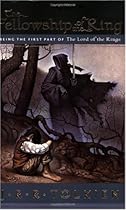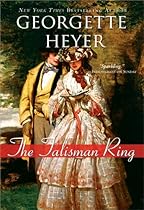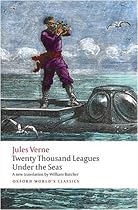During the first two weeks of March, I read three lighter genre classic authors. J.R.R. Tolkien’s Fellowship of the Ring took me to the fantastic Middle Earth, Georgette Heyer’s The Talisman Ring was an amusing foray into romantic historical fiction (albeit an unrealistic one), and Jules Verne’s Twenty Thousand Leagues Under the Sea was an incredibly convincing science fiction novel that visited not space, as modern science fiction does, but the unknown seas of the nineteenth century.
Fellowship of the Ring by J.R.R. Tolkien
When I was in college, an English teacher assigned the first novel of J.R.R. Tolkien’s three-part story for a class discussion on symbolism and I hated it. From the beginning of the Fellowship of the Ring, I found the “adventure” aspect to be boring: get in to trouble, get out of trouble. Repeat. Finding symbolism made it even more unenjoyable, and I wrote off Tolkien for life.
Fast forward nine(?) years to New Year’s Day 2008. My husband had a few days off from work and we were stuck in our townhome in Australia with a three-month-old baby, no air conditioning, forty degree (Celsius) temperatures. We were miserable and it was too hot to think of doing anything that required moving. So we put Baby on the floor, turned our fan up to high speed, and watched all the Lord of the Rings movies in a movie marathon of heat-induced lethargy. I didn’t think the story was so bad at all. In fact, I enjoyed it.
So when my husband wanted to begin reading The Silmarillion together, aloud, during our road trip in New Zealand a few months later, I agreed. We took it slowly and one thing led to another, so after six months I ended up finishing it myself (thoughts here). I loved Tolkien’s language, and even more I enjoyed the complex world he’d created.
I wasn’t as interested in The Hobbit (thoughts here; writing style, for one, was such a letdown after Silmarillion), but that may be because I am no longer a child. I will read it to my son some day and see what he thinks.
 Enter: Fellowship of the Ring, take two. Since I chose to read it, I found myself enjoying it, despite my expectations that I would again dislike it. From the beginning, I again enjoyed the world Tolkien created, especially the traditions of the elves. My favorite parts were the beginning (meeting the hobbits and getting started on the quest) and the discussion of tradition and folklore, especially among the elves. Although the details of The Silmarillion have faded already (because I read it so slowly, I knew I was going to forget details quickly), I loved the echo between the books. Mostly, I just love Tolkien’s world. Since he creates the traditions and tells them and retells them so smoothly, I can’t help but believe it is true. Middle Earth and the elves must exist somewhere, right?
Enter: Fellowship of the Ring, take two. Since I chose to read it, I found myself enjoying it, despite my expectations that I would again dislike it. From the beginning, I again enjoyed the world Tolkien created, especially the traditions of the elves. My favorite parts were the beginning (meeting the hobbits and getting started on the quest) and the discussion of tradition and folklore, especially among the elves. Although the details of The Silmarillion have faded already (because I read it so slowly, I knew I was going to forget details quickly), I loved the echo between the books. Mostly, I just love Tolkien’s world. Since he creates the traditions and tells them and retells them so smoothly, I can’t help but believe it is true. Middle Earth and the elves must exist somewhere, right?
The book succeeds in ways that the movie cannot possibly. The characters and timeline, for one, are much clearer. While in the movie Frodo looks like a teenager, in the book he’s in his 50s when he starts on his quest: it has already been 17 years since Bilbo’s disappearance. I loved the more realistic methods of travel (i.e., it took a while), and while it’s still irritating how “convenient” all their rescues are, it isn’t nearly as irritating as the sped-up timeline of the movie.
I can’t say I love Fellowship of the Ring. Although I really did enjoy it, the parts I enjoyed were the light ones: I am not a fan of horror stories, and knowing the plot of subsequent movies, I suspect the novels grow increasingly full of “evil” and “darkness.” Even if good ultimately prevails, I’m still wary of the sinister aspects that may come in the coming novels. That said, I am hooked for the rest of the read-along: I want to know how Tolkien, and not Peter Jackson, resolves the story.
I will probably read the last two books and write about them together, whether they are read in March or April.
The Talisman Ring by Georgette Heyer
I had been told that Georgette Heyer’s novels were like Jane Austen. I’d been told they were not like Jane Austen but they were just as delightful. I wasn’t sure what to think, although he pastel-colored covers of Heyer’s reissued novels were completely unappealing to me. I almost dreaded reading Heyer.
 To my surprise, I enjoyed my first experience. It wasn’t a favorite novel, and I’m not sure I’m sold on Heyer in general, but that may be because of the novel I chose. I am not sure The Talisman Ring was the best place to start: it was completely non-serious and unconvincing as a historical romance. I felt I was reading about modern day people thrust into an old setting. Although it was the 1790s, the people didn’t feel accurate for the era; they were ridiculous caricatures.
To my surprise, I enjoyed my first experience. It wasn’t a favorite novel, and I’m not sure I’m sold on Heyer in general, but that may be because of the novel I chose. I am not sure The Talisman Ring was the best place to start: it was completely non-serious and unconvincing as a historical romance. I felt I was reading about modern day people thrust into an old setting. Although it was the 1790s, the people didn’t feel accurate for the era; they were ridiculous caricatures.
Then again, maybe that is the point of a Heyer novel. It was meant to be fun and funny and it was. It showed a light side of the era and I can appreciate that. My problem was that I was expecting a bit more substance. I have been reading so many classics this year that I suspect I began the novel wanting to see depth to the characters, the plot, or at least the writing. I found none of that.
Surely, it was fun. French-raised Eustacie is betrothed to her dull cousin Sir Tristram Shield but she longs for adventure such as that of her unknown and mysterious cousin Ludovic Lavenham, who is wanted for murder. When she runs away from Sir Tristram to find adventure, she stumbles upon Ludovic and with a newfound friend, the also adventurous Miss Sarah Thane, the cousins all endeavor to solve the mystery of what happened to Ludovic’s talisman ring in order to clear his name.
Heyer was not a deep read, but it certainly was an enjoyable one. I wish I was better prepared going in. At least now I know, and the next time I’m in the mood for a light and humous look at historical England, I know where to look.
Although I selected this book for the March Classics Circuit celebrating Heyer, I dropped myself off the schedule due to the things that came up.
Twenty Thousand Leagues Under the Sea by Jules Verne
 My favorite “genre classic” by far was Jules Verne’s science fiction masterpiece, Twenty Thousand Leagues Under the Sea. Science fiction it surely was, because Verne described the mechanics, the earth science, the zoological science, and the oceanic science behind every single thing observed or invented by the characters within its pages.
My favorite “genre classic” by far was Jules Verne’s science fiction masterpiece, Twenty Thousand Leagues Under the Sea. Science fiction it surely was, because Verne described the mechanics, the earth science, the zoological science, and the oceanic science behind every single thing observed or invented by the characters within its pages.
In the 1860s, a mysterious sea creature is found disturbing sailing vessels across the globe, uniting the world is a quest to destroy the beast. When the mysterious beast sinks quest ship, Professor Pierre Arronax, his dutiful servant Conseil, and the harpooner Ned Land are thrust overboard, only to find the beast is the submarine Nautilis, captained by the mysterious Nemo.
Jules Verne was a master of convincing writing. I felt I was reading a real account of a circle of the globe (20,000 leagues refers to the distance around the globe, not the depth gone). His details on how the ship worked and the species observed from the window of the submarine all convinced me that this truly happened. Just as with Tolkien’s world, I felt Professor Arronax must assuredly have made this journey underneath the sea. Obviously, with the science we know now, some things were obviously fictional as I read them (for example, the visit to the south pole made me laugh). However, the novel as a whole was so creatively presented that I still loved it. There is a reason it’s considered classic.
The characters were interesting to me from a historical perspective. Professor Arronax is the one narrating the story, and it’s clear that is a class bias that dates the story. His servant, Conseil, doesn’t hesitate to jump overboard when he sees his master has fallen overboard. The professor thinks nothing of this other than observing what a great servant he has. And despite the fact that all three are trapped on the Nautilus, Nemo only gives personal attention to the professor; the apparently lower-class harpooner is shuttled off to a different compartment and never given private interviews with Nemo, as Professor Arronax is always given. This showed how class-conscious Verne was, I believe, because he doesn’t seem to notice how discriminating he was against his characters. It seems to be a comment on the era in which the novel was written, whether Verne intended that to be or not.
There were flaws with this novel, and they revolved around the ending. While the story continually developed tension and mystery, things were never resolved satisfactorily. In fact, it seemed to end in a sudden way. In some respects, Verne needed to end it quickly: nothing else would have been appropriate. We can’t know the details of escape, for example. But given the mystery surrounding Capitan Nemo throughout the book, by the end, I’d hoped for some more understanding of the man himself. Where did he come from? Who was he? From Wikipedia, I gather that we learn more in the companion books Verne wrote, but since neither of those books sound as interesting to me, I might not read them. I’ll never know who Captain Nemo was or why he built the Nautilus to escape society.
I listened to the first two-thirds of the novel as I painted, and then I read the last 100 pages because the library-downloaded audiobook had expired. For me, it was better when I was listening because I didn’t feel rushed or bored: I was busy working and it was a pleasant way of helping the time pass. As I read it, however, I found myself a bit bogged down by some of the zoological details. Maybe I was just ready for it to be over by that point!
At any rate, Twenty Thousand Leagues Under the Sea was my favorite of these three genre novels, and I hope to visit more Jules Verne in the future. He’s great!




I’m stlll not interested in reading Heyer…
I wonder really if I might need to retry Verne. Around the World in 80 Days was okay, but a little boring and dry, and stereotypical in places. I was just meh about it. But 20,000 Leagues sounds like it might be better!
.-= Amanda´s last post on blog ..Death in Venice, by Thomas Mann =-.
To be honest, Amanda, neither was I, but that’s what tons of people wanted to read for the Classics Circuit and since I’m asking them to give my favorite classic authors a try, I decided to give Heyer a try. I think there’s a reason she’s classics, it’s just not QUITE my favorite kind of classics.
Despite the fact that it takes place under water, 20,000 Leagues is still a bit dry in places — at least it was as I READ it and listened to it. I still enjoyed it very much with all the zoological details. Much more than Around the World, which I found unspectacular.
I have to admit I have no desire to read Heyer despite some of the glowing recommendations I’ve seen online. You did, however, get me all sorts of excited for Verne; although he may have to wait a bit as he is currently not in my TBR pile.
I’m glad you ended up enjoying LotR (or at least FotR) as it is one of my favorite worlds. I feel the same way about The Hobbit, too kiddish, and the Silmarillion, a wonderful world construction. I want to read the HoME series but I just haven’t had the urge. Have you read any of them?
.-= Trisha´s last post on blog ..Hogwarts Reading Challenge =-.
Trisha, as I just said to Amanda, I honestly wasn’t excited about Heyer either. But I did end up enjoying it, so I’m glad int he end. Really liked the Verne. Never heard of HoME. Don’t even know what it’s about. Is that Tolkien too?
Your Lord of the Rings film marathon story makes me yearn for a LOTR marathon of my own! My little sister is coming home today for spring break, and we have been planning a LOTR marathon for months now. Donuts for breakfast + cheesy fries for lunch + Viggo Mortensen being sexy = nonstop guilty pleasure day. 🙂
.-= Jenny´s last post on blog ..My sister’s coming home! =-.
Jenny, It was fun! Although I’m not a die-hard LOTR fan, so I’m not eager to have another one…
I’m so sorry you didn’t like The Talisman Ring as it’s one of my absolute favorite Heyers. I personally didn’t find the characters to be caricatures at all- I think it’s just Heyer’s style to write like that. I know a lot of people dislike it, but for some reason, I just eat it up!
.-= Aarti´s last post on blog ..Sunday Salon: Do you fall for the hype? =-.
Hi Aarti, I think you misunderstood a little — it’s not that I didn’t like it! I enjoyed reading Talisman Ring in the end, but I did find it to be nothing overly spectacular, including the characters. As I say, I do think there is a reason Heyer is considered “classic,” its just not my favorite kind of classic.
[…] Genre Fiction: A Tolkein, A Heyer, and A Verne | Rebecca Reads […]
I’m so glad you’re enjoying LOTR this time around! The subsequent books do get a bit darker, but there are moments of levity. But if you like the world-building, I think you’ll be impressed with the world-expanding in the Two Towers.
I’m reading my first Heyer now–A Civil Contract–and I’m really enjoying it. I’m actually finding it to have more substance than I expected, but I’ve also heard that it’s a book that tends to divide Heyer fans. Some think it’s her best, and others don’t like it at all. But I’m liking it enough to try more, unless it takes a terrible turn in the last half.
.-= Teresa´s last post on blog ..Hush =-.
Teresa, oh good I can’t wait to find time to read Two Towers! I like world-expanding 🙂 And I’m glad your enjoying your Heyer. Sounds very interesting — divisive books are intriguing…
I love Jules Verne! I read a lot of his books as a child/teenager, but I haven’t read one for a while now. I’ve had Twenty thousand leages under the sea in french on my shelf for a long while, so maybe it’s time to start practising my highschool french again!
.-= Paula´s last post on blog ..Läsdagbok v11 =-.
Paula, It would be so hard in French, I think, because of all the zoological names, etc.! But awesome that you love Verne so much. I read Around the World in 80 Days and was underwhelmed, so I’m glad I enjoyed this one. Looking forward to more!
[…] Book Reviews, The Book Nest, A Work in Progress, She Reads Novels, Bookshelves of Doom, Rebecca Reads. Have you reviewed this book on your blog? Let me know and I’ll add your […]